On being (or not being) an Irish-American producer with a show to make
When I was in grade school, I did the "identity math." You remember "identity math." You reach back into the family tree to determine what countries your ancestors came from on both your mom and dad's side and you do the math. Me, I had a grandfather who immigrated from Italy, a great-grandfather and great-grandmother who immigrated from Belgium, a great-great grandfather and great-great-grandmother who immigrated from Ireland and another set of great-great grandparents who also immigrated from Ireland, with a great-grandfather who had some British lineage and who knows what else. The calculation of identity then went like this: 1/4 Italian, 1/4 Belgian and 1/2 Irish. Half Irish! How phenomenal. So what is half Irish anyway? Despite the designate, I still don't really feel it.
This proved to be my largest challenge in conceiving and shooting what we finally named (with characteristic imaginativeness) "Irish Chicago." Thinking back to my childhood, I didn't consider my north side and later the north suburban youth to be Irish (or so I thought). St. Patrick's Day was not a huge special deal. We didn't attend the parade. When my paternal grandparents took a trip to Ireland, the grandkids didn't all sit down with them and use it as a big opportunity to take notes or connect with a sense of where we were from, or why we came. The most significant connection I had to being Irish was my name. I was Daniel because Daniel Murphy was my great-great grandfather, and Daniel's sons and daughters wanted to name a child after him, but they had daughters. (The family names are Donovan, Murphy and Coffey.) And of those daughters, only my grandmother had children, and she had daughters. I was the first male child in decades and so I was named Daniel. That certainly raised my curiosity about Murphy. But my feeling for his experience was really tied up in the life of his family in a tiny town south of LaSalle, Illinois called Oglesby. And that felt like a small town early 20th Century Illinois, not an Irish story. So while my grandmother was very important to me, she was a small-town girl who came to Chicago with her Italian immigrant husband, not an Irish girl in Chicago.
I began talking about this lack of feeling for my own heritage with everyone who would bother to listen. I spoke with friends who I felt invested in their heritage in some way, whether it be Irish, or Jewish, or Greek, or African-American. One African-American friend expressed some shock at my general indifference. "We are starved for some history, sense of our identity, for connection with our African roots. Maybe because we don't have it at our fingertips like you do." That gave me something to think about.
I spoke with both my parents about their families. My dad reminded me of something I had heard many times but hadn't really thought much about â that Richard Donovan, an immigrant who arrived most likely in the 1880s, was a successful man, the groundskeeper at Rosehill Cemetery on the city's northside, and the owner of a large chunk of land near Clark and Granville platted as Donovan's subdivision. The wild thing about this is that I grew up just two and half blocks from there, on Thome a block and half east of Clark. I also was baptized in and received my first communion in St. Gertrude's Church on Granville and Glenwood. According to my father, Richard Donovan helped found St. Gertrude's and helped to build the wooden church that preceded the current concrete structure. His house is still there, up on a hill. At one time it was surrounded by open land with tennis courts and greenhouses. An interesting success story, not a story of unskilled labor and bar ownership.
My mom reminded me that my great-grandfather was not a Catholic. He converted in order to honor his wife Winnie Murphy. I had certainly forgotten about that. And he wasn't Irish – he was a Burr, and that's a name you can find if you spend a little time looking up famous ill-advised duels of American history. But my mom and my aunt reminded me of the brogue their grandmother had, and her habit of wondering if the recently deceased in the obits was Catholic or not. "As if that mattered," mused my aunt. Apparently, it mattered to my great-grandmother.
My grandmother was a private woman who was very devoted to all of us. She was very proud of all of us and very connected to family. As an older woman, she volunteered at the church. She had a bitter wit, an impatience with old age and was very oriented to hard work. She loved reading, and loved media. Irish? Could be.
Two of the people I approach with my Irish problems were my friends Megan Williamson and Tim O'Malley. I went to grade school with Megan – Catholic grade school actually. And high school – public high school. Not that Megan and I have deep memories of our time together there. We don't. Megan is an artist and I met her again a few years ago at an opening. And I recognized her. The shared dimly remembered past was enough for a friendship to develop. And Tim is an actor I met when doing a story about his play "godshow," which detailed his recovery from alcohol addiction and made much of his Southside Irish identity. When I mentioned to Megan I had to make a show about the history of the Irish in Chicago she offered up incredible stories of her family, which took them back to the stockyards and the famine, and included religious intolerance, murder, superstition, family bonds. And O'Malley surprised me by telling me his family was aggressively not Irish in their orientation, believing it the root to marginality. In fact his father worked against some of the worst of the intolerant trends in the Beverly neighborhood in the 1960s. But Tim's big story was that of his railroad family from the south with an invention in their pocket that made them millions. However, death intervened and changed the family's fate. That sounded very Irish to me.
In between my own doubt, my own re-discoveries and the stories Megan and Tim told me I felt I had the seeds of an approach to the show. I could make a show that told the history but also examined heritage in action, what it meant to people who walked among us without green hats and a great need for beer and parades who nonetheless had relatives, Irish-American relatives, who were part of the larger fabric of the city's history, in complex, painful, surprising and interesting ways. And I could contrast this experience and vision against those who did wear their identity with great pride and active interest. In this way I might find some answer to the question of why the need to actively be Irish could be dominant and why I might have little interest in holding onto it. Where does that come from? It comes from family, of course. But why would some family members push it forward and others bury it? And that might make the show accessible to a larger audience.
So I began shooting by going to hang out with Megan at her house where she lives with her husband and son, and follow her out to her garage studio where she told us the stories that I found so captivating when I first heard them. And I continued by spending much more time with Tim than was budgeted. He was generous with time and insights and arranged for a number of musicians to perform his marvelously comic and politically incorrect song "I am the Irish" which we shot at Chief O'Neill's on Elston, a fantastic restaurant and pub. Along the way, I found five other generous and fascinating people who sat on the spectrum of identity, and represented different generations of immigration, from recent to those who family came to do work on the Illinois & Michigan Canal in 1835. Their stories are at the solution to the challenge that vexed me at the start.
And how am I Irish? Suspicious at times, potentially witty (I leave that for others to judge), guarded, sentimental, hard working, and thinking very much about what I have here and now that might add something to my own life and sense of self. I came to understand my own lack of excitement about heritage might be linked to what drove people out of Ireland, from starvation and poverty and limited options to trouble with the law. And that Chicago, despite being so linked to the Irish by mid-20th Century, was a town that looked down on its Irish and encouraged their own inter-ethnic division between the pretenses of the upwardly mobile barely middle-class apartment dwellers (read "lace-curtain Irish") and those still toiling in the working class, or linked to the "old neighborhood" (read "pig-sh*t Irish" ). Given those options, maybe it was best to move on, and find another way to create an identity in our fair city.


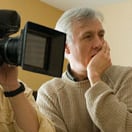
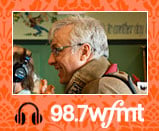
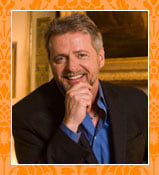
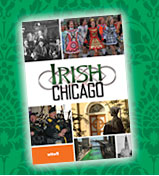
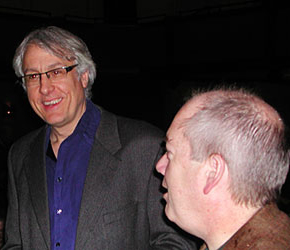
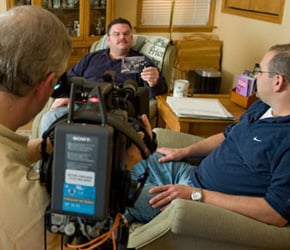
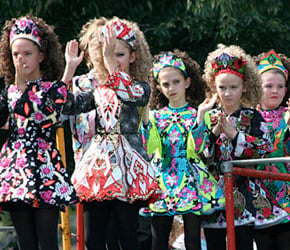








3 Comments:
This post has been removed by the author.
Loving the show! I am looking forward to using parts of the video in my classroom. Now that I live on the South Side of Chicago this heritage has more meaning for me.
Last night watching the show, I felt a deep understanding of why I have always felt Irish, but at the same time almost embarrassed at not being "Irish." Doing the "math" I'm mostly Irish, with some Scottish, (not Scots-Irish), and English. But saying I'm McHugh or Friel meant I was "that sort" of Irish (Catholic) in a family that was trying so hard to be respected (and Protestant). So, even though my mother still identifies herself by which parish she grew up in (Our Lady of Sorrows back in the day), studied Irish dance, and still talks about her father (Sam McHugh, God-bless-his-soul) and his work on the railroad as a master mechanic on the south side; even though my grandpa near the end of his life talked about his Irish-born mother with a free tongue and with such love; even though I play bodhran and do some Irish dance; there is still a sense that there is more "prestige" in saying I'm Mass. Bay Colony stock (which the English side can say). I can relate to exactly that sentiment of identity and choice making addressed in the producer's post above. But after the show last night, I feel empowered to say: Yes, I may be a Celtic mutt, but I'm mostly Irish by heritage and heart. And PROUD of it. Fabulous show. I ordered the DVD for my mother Pat McHugh. She's going to love it. (BTW, the book "Images of America: Irish Chicago" is great. Has wonderful photos, including some from Our Lady of Sorrows that I showed my mom. Definitely worth owning.)
Post a Comment
<< Home